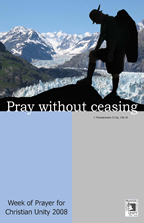 by The International Preparatory Group by The International Preparatory Group
The “Week of Prayer for Christian Unity” for 2008 celebrates the 100th anniversary of the inauguration of the “Church Unity Octave”. One hundred years ago, Father Paul Wattson, Episcopal (Anglican) priest and co-founder of the Society of the Atonement at Graymoor (Garrison, New York), introduced a Prayer Octave for Christian Unity that was first celebrated from 18 to 25 January 1908. Exactly sixty years later, in 1968, churches and parishes around the world received for the first time material for the Week of Prayer for Christian Unity, which had been jointly prepared by Faith and Order of the World Council of Churches and the Secretariat for Promoting Christian Unity (Catholic Church).
Today the cooperation between Anglican, Protestant, Orthodox and Catholic churches, parishes and communities in preparing for and celebrating the week of prayer has become a familiar practice. This simple fact is in itself a strong evidence for the effectiveness of prayer for unity. It gives us every right to speak about the history of the Week of Prayer for Christian Unity as one of success, and a reason for great joy and gratitude. However, it is also evident that praying for unity is not an invention of the last century. Jesus himself prayed to the Father “that they all may be one”. Christians have made this prayer their own in myriad ways ever since. In the midst of our divisions, Christians of all traditions have prayed with an awareness of their union with the prayer of Christ for the unity of all his disciples. The ancient daily liturgy of the Orthodox churches, for example, invites the faithful to pray for peace and for the unity of all. The antecedents of the Week of Prayer for Christian Unity date back to the middle of the 19th century. The importance and the need of prayer, and not least, of prayer for unity among divided Christians, was emphasized in a number of different church movements and circles — among them the Oxford Movement, the Evangelical Alliance and various women's prayer initiatives.
In our baptism we commit ourselves to the following of Christ and the fulfilment of his will. This will for his followers was expressed in a prayer for unity so that others would come to believe in him as the one sent by God. Prayer that joins Jesus' prayer for unity has come to be referred to by some churches as an expression of “spiritual ecumenism”. This prayer is most intense during the Week of Prayer for Christian Unity but needs to flow out of this observance into our daily lives. We realize that Christian unity cannot be solely the fruit of human efforts, but is always the work of the Holy Spirit. We cannot as humans make or organize it. We can only receive it as a gift of the Spirit when we ourselves are prepared to receive it.
Spiritual ecumenism calls forth an exchange of spiritual gifts so that what is lacking in each of our traditions finds its needed complement; this enables us to go beyond denominational labels to the Giver of all gifts. The surprising thing about prayer is that its first effect is in us. Our own minds and hearts are shaped by prayer as we seek opportunities to translate that prayer into practice, the true test of its authenticity. Spiritual ecumenism leads us to a healing of our memories. We face those difficult events of the past that give rise to competing interpretations of what happened and why. As a result, we can go beyond those things which have kept us divided. In other words, the goal of spiritual ecumenism is Christian unity that leads us into mission for the glory of God.
If believers are to follow Jesus, they must work and pray for Christian unity. However, the churches have differing visions of the visible unity for which we are praying. For some, full visible unity is the goal, bringing churches together in common confession, worship and sacraments, witness, decision-making and structured life. Others look to a “reconciled diversity”, with the present churches working together to present a coherent witness to the world. For still others unity is found rather in the invisible bonds linking us to Christ and with one another, with an emphasis on personal ways of living one's faith in the world.
In this context, prayer for Christian unity is a challenging prayer. It is prayer that effects change in our own personal identity as well as in our confessional identity. Ultimately it means that we will give up our way of seeing unity in favor of concentrating on seeing what God wants for his people. However this does not mean that we will divest ourselves of our uniqueness, for unity naturally expresses itself in diversity. It is unity in diversity which reflects the mystery of communion in love, as seen in God's own being.
|
